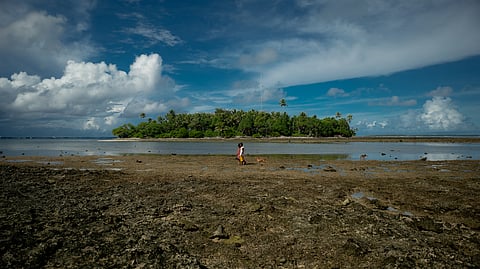Climate Change Causing Global Heatwaves - Countries Must Rapidly Adapt
Heat is the clearest signal of climate change – and deadly heat will get even worse over the next 30 years as we struggle to act.
Heatwaves are growing in frequency and intensity around the world due to climate change.
Scientists have been warning for some time that the rise in global average temperature, as greenhouse gas levels mount in the atmosphere, is causing an increase in the risks of hot weather.
The threat of heatwaves will carry on climbing while greenhouse gas levels continue to accumulate.
As 2050 is the earliest target date currently being discussed for global emissions to be cut to net zero, that means extreme weather, including heatwaves, will become ever more severe for at least the next 30 years.
Countries that already experience high temperatures are having to adapt to even more fierce episodes of heat.
Some are beginning to pay more attention to a combination of heat and humidity that prevents the human body from staying cool through sweating.
A so-called ‘wet bulb temperature’ equivalent to 35 degrees Celsius with 100% relative humidity would make it dangerous for even healthy people to spend extended periods outdoors, particularly if they are carrying out physical activities.
Effects of heatwaves
Many hot countries already recognise that people are less productive in extreme heat, and so those employed in sectors such as construction and farming avoid working outside during the hottest parts of the day.
Climate Change Scare: The First Red Extreme Heat Warning Issued in UK
But countries that are unused to scorching temperatures are struggling to cope. A heatwave in late June 2021 in northwestern North America resulted in hundreds of deaths and contributed to extreme wildfire conditions.
Western Europe has an even worse track record of dealing with extreme hot weather. A heatwave in August 2003 is estimated to have killed more than 70,000 people.
In the UK, hundreds of people die every summer during summer heatwave conditions.
Almost all who die are elderly and have underlying health conditions, particularly respiratory illnesses. As a result, the health impacts of heatwaves have been largely hidden and under-appreciated.
Death certificates often do not record the role of heat, and the true scale of the loss of life only becomes apparent when spikes in mortality during hot days emerge from the analysis of public health statistics, usually several months later.
Many lives could have been saved if more attention had been paid to prevent overheating in homes.
People who are vulnerable to high temperatures often die inside buildings that are significantly hotter than outside.
Possible solutions to heatwaves
The British Government recently responded to the threat of overheating in buildings by tightening building regulations so that issues such as ventilation are properly addressed.
But many existing homes need to be retrofitted to stop them becoming dangerously warm. Preventing overheating is as important as improving insulation and energy efficiency.
However, the population also needs to be educated to take proper precautions, for instance by closing windows and blinds to keep out hot air and sunshine during the warmest parts of the day.
And a better social support network needs to be created so that those who are vulnerable and live alone are not left to perish in their homes.
The effects of heat can kill much more quickly than cold does. Many people who die during hot weather do not manage to alert the emergency services or reach hospital.
Livelihoods and the economy suffer as well during hot weather because workers are less productive in overheated offices.
An increasing reliance on air conditioning is not a solution. It can be expensive to install and operate, making it unaffordable for poor people. And it creates the risk of power cuts through surges in electricity usage.
People who live in cities are particularly exposed to the risks of heatwaves due to the urban heat island effect.
Read More: Adapting to Climate Change can Save Lives & Livelihoods


